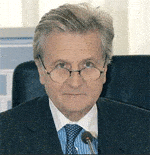 |
|
Trichet: Questions investors’ reliance on credit ratings. |
The subprime mortgage crisis in the US has forced the president of the European Central Bank (ECB) to speak out about the new sources of risk being created by the market’s appetite for increasingly complex financial instruments. At the European parliament’s Economic and Monetary Affairs committee hearing, Jean-Claude Trichet stated that innovation and creativity in global financial markets may have improved financial efficiency, but it had also created new forms of risk.
The problem, says Trichet, is that banks’ and investors’ appetite for new investment structures is not matched by sophisticated management of the risks generated by these new instruments. “The degree of complexity of some products that are designed for the purposes of re-packaging and selling debt instruments has become overwhelming,” he stated. He balked at stifling the industry’s “creative” urges but said the industry needed to broaden its understanding of risk. “Investments and structures that cannot be fully understood even by those who bear the ultimate responsibility of the level of risk taken by financial institutions should not be acquired or set up by banks and investors who are lacking sufficient sophistication in the management of the risks,” he said.
Trichet also questioned the reliance on credit ratings agencies, saying their opinions were no substitute for firms’ own due diligence and credit analysis. He added that “possible benchmarks for improved behavior” and reducing potential conflicts of interest could well be in the cards.
Taking some of the regulatory pressure off hedge funds and private equity groups, Trichet attributed the current market volatility to “non-regulated entities” such as conduits and special investment vehicles, not highly leveraged hedge funds. “We have to improve very substantially our handling of conduits and special vehicles,” he said.
Enhanced financial sector surveillance by regulators is perhaps not what the banks wanted to hear, but Trichet insisted that despite improvements in determining correct “capital buffers” for banks under the Basel II Capital Accord, there was still a need for ongoing investment in “stress testing” measures.
Anita Hawser



